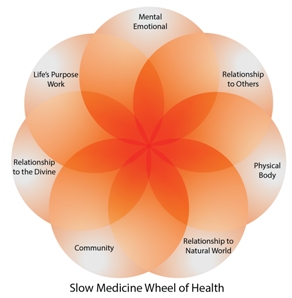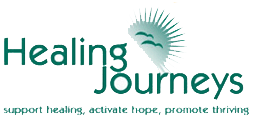There are two basic methods to respond to cancer in our bodies. The one that Western medicine predominantly focuses on is to fight the disease. Integrative medicine also addresses the terrain of the body/mind/spirit in which the cancer is growing.
The metaphor of a garden is often used. We plant a seed, but the terrain in which it is planted determines whether or not it will grow. The soil is as important as the seed.
In July and September, we offered a workshop with Dr. Michael Finkelstein, the Slow Medicine Doctor, called Loving Your Body. Dr. Finkelstein focused on how to make the terrain conducive to health. Central to the definition of Integrative Medicine is the body’s innate ability to heal. Our bodies know how to get rid of intruders, and often do so without us even knowing about it. Our Parasympathetic Nervous System is where rest, rejuvenation, digestion, and healing happen.
The Sympathetic Nervous System in the body is designed to be a quick response mobilizing system that promotes a “fight or flight” response, corresponding with arousal and energy generation, and inhibits digestion. It is very useful when we are being attacked by a bear and need to get away. But in our modern world many of us respond as if we are being attacked all the time. We live our lives in Sympathetic Overdrive.
We live in a time when anxiety is a collective issue and doesn’t just come from us. But we also contribute to the anxiety when we are in fear or worry. And who isn’t in fear when you receive a cancer diagnosis? I have heard that the most important thing a person can do when diagnosed with cancer is to learn stress reduction techniques, because a cancer diagnosis can put us into Sympathetic Overdrive where healing can’t happen.
Dr. Finkelstein began the workshop by saying that we probably expected him to add to the list of things we should do to eliminate cancer in our bodies. He said he wanted to do the opposite. He wanted us to let go of the burden of having to do everything right. He wanted us to learn how to relax and not be so hard on ourselves.
The Slow Medicine way is to first of all slow down and look at where we can increase the balance in our lives. The way we are out of balance can be different for each of us. He gave us the 77 questions from his book, Slow Medicine: Hope and Healing for Chronic Illness, that can help us in knowing where we need balance.
In the Slow Medicine Wheel of Health, he suggests the areas where we might look for balance (click picture to enlarge):

Much of this information wasn’t new to me, but it was the reminder I needed that I can make a difference in the progression of my cancer. I also like that there is so much overlap between the Slow Medicine way and the Radical Remission way, which I have been writing about in my blog for the past 4 years. The terrain is up to me, and there is increasing evidence and acknowledgment that it makes a difference.
As always, I welcome your comments; to reply please click here.
In the Spirit of Healing,

Jan Adrian, MSW
Founder and Executive Director


Hi Jan-
Thank you so much for the frequent words of inspiration & wisdom. My heart is with you as you walk your life path. Pat Blair Pierce